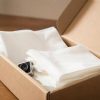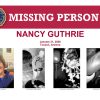
39 of 87 passengers had responded to contact tracers as of Monday afternoon — leaving 48 yet to be reached
Credit: AFP
Dozens of passengers are yet to be traced from a plane to Scotland that was carrying three people who later tested positive for the Brazilian Covid variant, despite the flight taking place in January.
The strain, which is feared to spread more rapidly and respond less well to vaccines after being identified in northern Brazil in January, was found in three asymptomatic Scottish residents who flew into Aberdeen on the BA1312 flight from London Heathrow on January 29. They had arrived in London from Brazil via Paris.
While attempts have been made to contact all 87 remaining passengers on board the flight, the Scottish Government confirmed that only 39 had responded to contact tracers as of Monday afternoon — leaving 48 yet to be reached.
Additional approaches are now being made to contact the remainder, a spokesperson confirmed, “particularly for those where incorrect data has been provided”. The Government is also asking that anyone on the flight who did not provide up-to-date contact details to call the NHS National Contact Tracing Centre on 0800 030 8012.
Scotland’s national clinical director, Prof Jason Leitch, confirmed the three people who tested positive for the variant work for an oil company and were working offshore in Brazil before flying home to Aberdeen.
The situation was “well handled” by the three individuals, their families and employer, he said.
“They were from a high risk country, so they followed the instructions and there is no suggestion of any blame or concern about their behaviour. I think that’s very important."
Jeane Freeman, the Health Secretary, said there is no reason to believe that the P1 strain is in circulation in Scotland but efforts to "identify and break any possible chains of transmission" are ongoing.
Health officials began hunting for possible cases after it was revealed over the weekend that six individuals infected with the “variant of concern” have been detected in the UK.
Speaking at the Scottish Government’s daily coronavirus briefing, Ms Freeman said that all passengers on the flight who had not yet been reached would be contacted “shortly”.
Three other cases of the concerning variant, which are not linked to the Scottish cases, have been detected in England with officials still scrambling to identify one of those who tested positive.
Jillian Evans, head of health intelligence at NHS Grampian, confirmed that the three Scottish travellers had arrived in Aberdeen in early February before the rules on hotel quarantine came into force.
She told BBC’s Good Morning Scotland that the passengers therefore self-isolated for 10 days after arrival in accommodation provided by their employer, and tested positive after having developed symptoms while in isolation.
Ms Evans explained that health officials are now following up “contacts of their contacts”, and anyone traced will be offered a Covid test.
"That’s not standard procedure, that’s going one stage further," she said.
"But of course they have been quarantined for 10 days in managed isolation for that period of time, so you would think that they wouldn’t have many contacts to follow up.”
The Health Secretary also sought to reassure the public that “everything necessary” is being done to ascertain whether the variant could have been transmitted in Scotland.
"I want to stress that there is currently no reason to believe that the P1 variant of the virus is in circulation in Scotland, however, I hope this summary reassures you that we are doing everything we can and everything necessary to check whether this variant of the virus could have been transmitted within Scotland and to identify and break any possible chains of transmission."
Current vaccines are effective against the strains of the virus which are already established in the uK, she said, but “more work is required to determine” that this is the case for emerging strains, such as the Brazilian one.
Ms Freeman added that the issue of international travel continued to be a point of contention between the UK and Scottish governments.
Why robust testing & quarantine policies are needed for international travel given # of circulating variants. And why just 'red-list' country approach doesn't work (flew from Brazil via Paris & London). Hopefully quickly contained in this instance. https://t.co/AK9rbiNpCb
— Prof. Devi Sridhar (@devisridhar) February 28, 2021
While all international passengers arriving at Scottish airports must enter the controversial hotel quarantine system, the UK Government only requires this of those coming from countries on the "red list" — most of which are in South America and Africa.
The UK Government’s requirement for hotel quarantine came into force on February 15 — around a month after concerns about the variant became widespread — and UK residents have continued to be allowed to return from Brazil using indirect fights.
Professor Devi Sridhar, a Scottish Government adviser and chair of global public health at the University of Edinburgh, said in a tweet that the arrival of the new variant showed the red list approach "doesn’t work", as the passengers in question arrived in the UK via Paris.
Ms Freeman said she agreed with Prof Sridhar’s assessment, adding that the Scottish Government has “consistently argued” that the red list on its own is “inadequate” and that international travel continues to be “the main area that we seek to persuade the UK Government to take steps on”.
Despite accusations that stricter and quicker restrictions should have been imposed on international arrivals, the Prime Minister said today that the Government "moved as fast as we could" to launch its quarantine hotel policy.
"We have got one of the toughest border regimes anywhere in the world for stopping people coming into this country who may have variants of concern,” he told reporters.























































Свежие комментарии